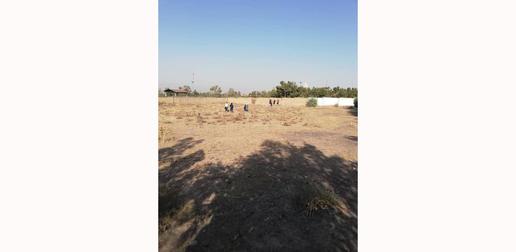A judge has told the families of three Baha’is arrested 10 days ago to expect heavy sentences, but has failed to provide any further information about their cases.
On August 17, agents of the Intelligence Ministry raided a Baha’i religious gathering in a garden in Shiraz, physically assaulted at least one person and verbally assaulted others before arresting all 24 people in attendance, most of whom were under 18 years old. The majority of those arrested were later released, but no details have been provided about three of them — Pezhman Shahriari, Kourosh Rouhani and Mahboub Habibi.
An individual introducing himself as Khosravi Nejad told the spouses of the three detainees that he had been appointed as the judge in their cases and that “they should expect heavy verdicts.”
One of those arrested was Kourosh Rouhani, who hosted the religious gathering in his garden. “Around 10am on August 17, more than 30 agents from the Intelligence Ministry raided Rouhani’s garden by climbing the walls and without ringing the bell,” one eyewitness told IranWire. “Then they started filming those present and shouting obscenities at them.”
Most of the 24 people in the garden were under 18. “We had a religious gathering to pray,” the witness told IranWire. “Contrary to the lies published on some websites, we did not have internet connection outside. The agents took Mahboub Habibi to a room and beat him. They struck his abdomen with a shovel handle.”
The agents presented warrants for the arrest of Mahboub Habibi, Negar Misaghian, Pezhman Shahriari and Dorna Esmaili. They also arrested two others, Niloofar Eettehadi and Hooman Esmaili.
Then the agents arrested Kourosh Rouhani, the host for the gathering, after he protested against the arrests of his guests. They took him and his two daughters — Areta, 16, and Ayesa, 10 — to cars parked outside the garden. The other detainees were interrogated, threatened and were not allowed to leave the garden until 4pm, when their families arrived.
After the raid, the agents took the arrestees to their homes, searched the premises without search warrants and confiscated computers, books and religious pictures. According to the eyewitness, “when the Intelligence Ministry agents arrived at the home of Hooman Esmaili, his grandmother fainted at the sight of the agents but the agents ignored her and left the house.”
They forced Kourosh Rouhani to give them his house keys while he was held in a car and then entered his house without a warrant or his permission. “In Mr. Rouhani’s home the table was set for lunch,” said the witness. “The agents assumed that a meeting had been going on and Rouhani had delayed them in the garden to inform his wife so that the participants could get away before the agents found them. Based on this assumption, they beat Kourosh when they returned to the car."
After searching the homes, agents released three of the arrestees. The rest were taken to the Intelligence Ministry’s detention center in Shiraz known as No. 100. Negar Misaghian, who is married to Mahboub Habibi, and Dorna Esmaili, the wife of Pezhman Shahriari, were interrogated from 3pm to 11pm and were then released.
A History of Mass Arrests in Shiraz
Authorities have carried out the mass arrest of Baha’is in Shiraz many times since the 1979 Islamic Revolution. On October 23, 1982, authorities arrested 45 Baha’is in Shiraz on the order of the prosecutor. On October 30, a week later, another 40 Baha’is were arrested. In all cases, they were arrested simply because of their religious beliefs. Some were later released but many of those arrested were subjected to interrogation and excruciating torture. The interrogations and torture were carried out to extract information about Baha’i organizations and to force prisoners to renounce their faith and convert to Islam.
The Revolutionary Court of Shiraz sent 22 of those arrested in 1982 to the gallows. The executions began on January 1, 1983, with the killing of Hedayatollah Siavoshi. The last of the group to die was Soheil Houshmand on June 28, 1983. The oldest among the executed Baha’is was Abdolhossein Azadi, 66, and the youngest was Mona Mahmoudinejad, a high school student of 17. The entire Eshraghi family — father, mother and daughter — were executed. Also executed were a mother and son, Nosrat and Bahram Yaldaie, and a young couple, Jamshid and Tahereh Siavoshi. Yadollah, the father of 17-year-old Mona Mahmoudinejad, was also killed.
Ahmad Sabet Sarvestani was the only one among them who died in prison as a result of torture before he could be hanged.
The arrests and executions of Baha’is led to an international outcry, which the Islamic Republic shrugged off. “If they were not spies you would not have made a sound,” said Ayatollah Ruhollah Khomeini, founder of the Islamic Republic, in a speech in 1983.
Much later in Shiraz, in the spring of 2006, Intelligence Ministry agents arrested 54 young Baha’is and a number of young Muslims who had been teaching reading, writing and hygiene to children in the poor neighborhoods of Shiraz — they were arrested despite the fact that they had obtained written permits from the City Council. The young Muslims were immediately released, but the Baha’is remained in jail. Sometime later they were tried by the Revolutionary Court in Shiraz on the charge of “activities against national security.” Fifty-one of them were given suspended sentences of three years in prison and were ordered to take Islamic education classes. The remaining three, Raha Sabet, Haleh Rouhi and Sasan Taghva, were sent to Shiraz’s Adelabad Prison to serve their four-year sentences.
And there have been other mass arrests of Baha’is in Shiraz. In early 2011,15 Baha’is were arrested and sentenced to prison terms from between one and three and half years. On July 16, 2016, seven Baha’is were arrested and 17 others were arrested later the same year.
More on Baha’i prisoners in Iran:
The Baha’i Prisoner of Semnan: 2,000 Days and Counting, August 13, 2018
Baha’i Woman Sent to Prison for BIHE Volunteer Work, July 26, 2018
Remembering Mona, 35 Years Later, June 22, 2018
Foreign Minister Zarif: What Baha’i Prisoners?, April 27, 2018
Ten Years Later: the Baha’i Seven are Free for Norooz, March 20, 2018
Freed Baha’i Leader: Jailing Baha’is is Futile and Pointless, February 17, 2018
Baha’i Teacher Jailed for Five Years, December 20, 2017
Young Baha’i Tries for University but Ends up in Jail, November 14, 2017
An Exclusive Interview With the Freed Baha'i Leader, September 19, 2017
A Living Story of 174 Years of Constructive Resilience, August 2, 2017
A Baha’i Brought an Al Qaeda Man in from the Cold, February 1, 2016
Faezeh Hashemi and Nasrin Sotoudeh Visit Baha’i Prisoner, May 13, 2016
Temporary Freedom for Jailed Baha’i, May 10, 2016
Lawyers Must Speak out for Baha’is, September 29, 2015
Baha’is in Iran: The Pressure Mounts, February 25, 2014
visit the accountability section
In this section of Iran Wire, you can contact the officials and launch your campaign for various problems



























comments